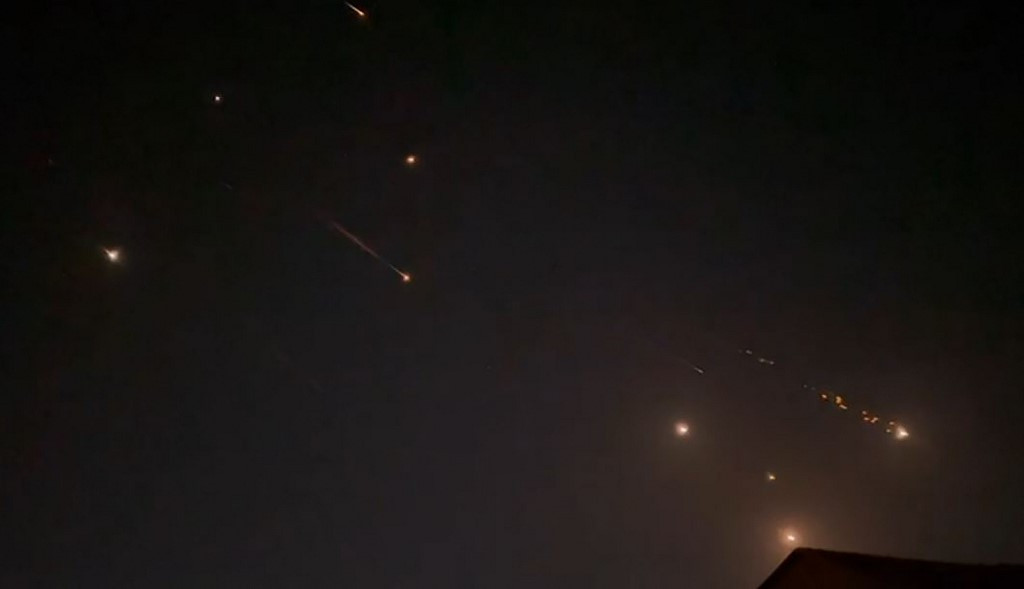
Tensions Flare as Israel Launches Strikes on Iran: Explosions Rock Isfahan, Fears of Wider Conflict Rise
A Shadow Over the Middle East: Decoding the Israeli Strikes on Iran and the Looming Peril
Jerusalem/Tehran/Washington D.C. – April 19, 2024: The pre-dawn calm in Isfahan, a city steeped in Persian history, was shattered on April 19th, 2024, by a thunderous roar. Social media erupted with videos of fiery explosions illuminating the night sky, painting a chilling picture of a region teetering on the precipice. These blasts, confirmed by US officials as an Israeli missile strike within Iranian territory, have sent shockwaves through the international community, raising the specter of a wider and potentially devastating conflict.
A Tangled Web of Tensions: Understanding the Underlying Conflict
The roots of this latest escalation lie deep within the complex geopolitical landscape of the Middle East. For decades, Israel and Iran have been locked in a bitter rivalry, fueled by ideological differences, Iran’s nuclear ambitions, and Israel’s support for Iranian dissident groups. Proxy conflicts in Lebanon, Syria, and Yemen have further strained relations, creating a tinderbox ready to ignite.
The Fog of War: Unraveling the Israeli Motive and the Unfolding Drama
The precise nature of the Israeli strike remains shrouded in secrecy. Speculation ranges from a pre-emptive strike against a suspected Iranian nuclear facility to a calculated move to cripple Iranian military capabilities. While the full picture remains unclear, one thing is certain: this brazen attack has triggered a chain reaction. Reports of near-simultaneous explosions in Iraq and southern Syria add another layer of complexity, raising questions of a coordinated assault or a potential response from Iranian proxies.
The world watched with bated breath as Iranian state media confirmed the explosion in Isfahan, offering no details on the target or potential casualties. The international oil market reacted with a swift and unsettling surge, reflecting anxieties about potential disruptions to Iranian oil exports, a crucial source of global energy supply. Commercial airlines scrambled to reroute flights, their paths circumventing key parts of Iranian airspace that were abruptly shut down in the wake of the attack.
A Global Plea for Calm: Navigating the Diplomatic Tightrope
The international community wasted no time in issuing urgent calls for calm and restraint. The United Nations Secretary-General pleaded with all parties to avoid further actions that could escalate the situation. However, translating these pleas into concrete action will be an uphill battle. The UN Security Council, a body often mired in partisan politics, faces the daunting task of bridging the chasm between Israel and Iran.
The United States, a staunch ally of Israel, finds itself in a precarious diplomatic position. While it may attempt to contain Iran’s potential response, it will face immense pressure from regional and international partners to urge Israel to exercise restraint. Regional powers like Saudi Arabia and Turkey will undoubtedly play a critical role in influencing the situation. Saudi Arabia’s long-standing rivalry with Iran might lead to a vocal support for Israel, while Turkey, with its historical ties to the region, could become a crucial advocate for de-escalation.
The Looming Peril: Potential Repercussions and a Frayed World Order
The potential repercussions of the Israeli strikes are stark and far-reaching. Iran, with a history of forceful retaliation, might launch missile attacks against Israeli targets, escalating the conflict beyond its current boundaries. Alternatively, it could utilize its network of proxy militias to strike back, potentially igniting a wider regional conflagration. A targeted attack on Iran’s oil infrastructure could further disrupt global energy markets, sending tremors through the already fragile global economy and exacerbating the ongoing energy crisis.
Beyond the immediate economic and military consequences, a full-blown war could plunge the Middle East, a region scarred by decades of conflict, deeper into chaos. A humanitarian crisis looms large, with the potential for mass displacement of civilians and devastating loss of life. The international order, already strained by global challenges, could face further fracturing.
Bridging the Divide: The Path Forward in a Precarious Hour
The path forward in this volatile situation requires a delicate but firm approach. Open communication channels between all parties will be critical in preventing further misunderstandings and miscalculations. The international community must exert collective pressure on both Iran and Israel to de-escalate and prioritize diplomatic solutions. Backchannel diplomacy, often conducted away from the glare of public scrutiny, could potentially pave the way for a way out of this crisis.
The coming days will be a defining moment for the geopolitical landscape of the Middle East and the world at large. Will the international community succeed in averting a wider conflict, or will the region be engulfed in the flames of war? The answer lies in the unwavering pursuit of diplomacy, a recognition of the devastating consequences of conflict, and a collective commitment to peace.

